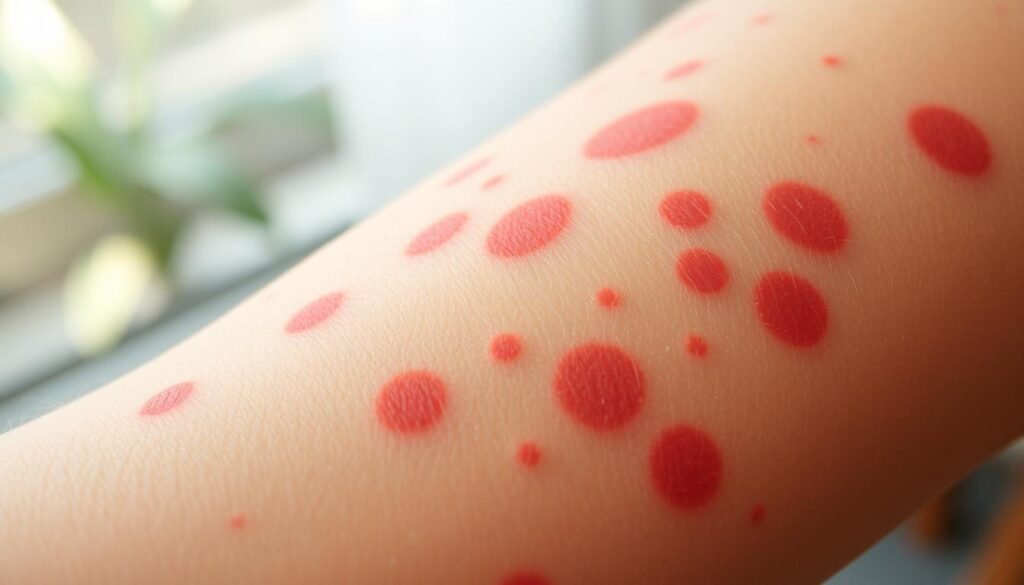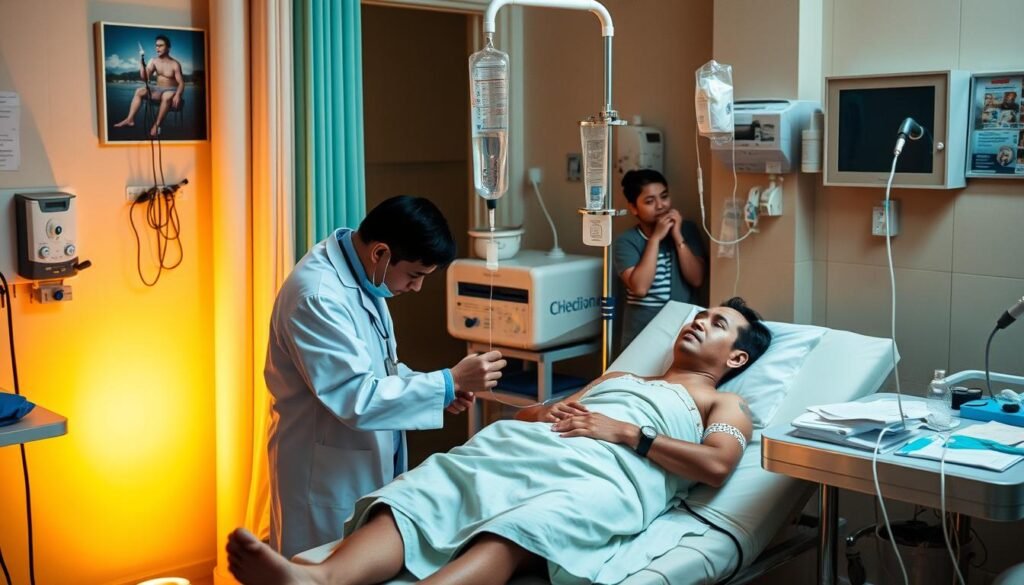Dengue Fever Symptoms in Adults is a growing health concern worldwide, affecting millions of adults. It’s a mosquito-borne illness that poses a big threat. Knowing the early signs and symptoms is key to getting help quickly and avoiding serious problems. But do you know how serious this disease is and how to protect yourself?
Table of Contents
Key Takeaways
- Dengue fever is a serious illness caused by a virus transmitted by mosquitoes, primarily affecting adults globally.
- Early recognition of dengue fever symptoms, such as high fever, severe headache, and rash, is essential for prompt medical care.
- Timely intervention and proper management can significantly reduce the risk of developing severe dengue, a life-threatening condition.
- Preventive measures, including mosquito control and personal protection, play a crucial role in mitigating the spread of dengue fever.
- Staying informed about the warning signs and seeking immediate medical attention can vastly improve the chances of a successful recovery.
Understanding Dengue Fever: An Overview
Dengue fever is a viral infection spread by mosquitoes. It has become a big health issue worldwide. Knowing how it spreads and who’s at risk is key, especially for adults.
How Dengue Virus Spreads
The dengue virus spreads through bites from Aedes aegypti and Aedes albopictus mosquitoes. These mosquitoes live in warm places and bite during the day. This makes them harder to avoid. The virus can also pass from a pregnant woman to her baby, but this is rare.
Risk Factors for Adults
- Living or traveling in areas where dengue is common
- Having a weak immune system, like from chronic illness or age
- Being exposed to different dengue virus types before
- Having certain genes that make you more likely to get it
Global Distribution of Dengue
Dengue fever is found in over 100 countries. It’s most common in the Americas, South-East Asia, and the Western Pacific. Climate change and more people living in cities have helped it spread. Mosquitoes like warm, humid places and cities.
Knowing the basics about dengue fever is important. It helps you spot early signs and get help fast. Being informed helps adults protect themselves and others from this serious illness.
Early Warning Signs of Dengue Fever
It’s key for adults to spot the early signs of dengue fever quickly. This is because getting medical help fast can help you get better faster. Look out for a sudden, high fever, severe dengue headache, and a dengue rash.
A sudden, high fever is a common first sign. It can reach 104°F (40°C) or more. This fever comes on fast, without warning, and may be accompanied by chills and body aches.
A severe, throbbing dengue headache is another early sign. This headache is hard to shake off. It often feels like it’s pulsing and can be especially bad behind the eyes.
- Sudden, high fever (104°F/40°C or higher)
- Severe, debilitating headache
- Development of a dengue rash
A distinctive dengue rash is also an early warning sign. It starts as small, red spots that spread across the body. These spots often first appear on the arms, legs, and trunk.
“Recognizing the early symptoms of dengue fever is crucial for adults, as prompt medical attention can significantly improve the chances of a full recovery.”
If you or someone you know shows these early signs, get medical help right away. Early treatment can greatly improve your chances of a full recovery and avoid serious complications.
Common Dengue Fever Symptoms in Adults
Dengue fever can cause a variety of symptoms in adults. These symptoms change as the disease progresses. Knowing the common signs is key for quick diagnosis and treatment.
Initial Phase Symptoms
The first signs of dengue fever are like the flu. You might have a high fever, severe headache, and muscle and joint pain. Fatigue is also common.
Many people get a skin rash that looks like red spots or a flushed face. Nausea, vomiting, and loss of appetite are also common in this early stage.
Critical Phase Manifestations
As the disease gets worse, some people enter a critical phase. This phase brings more severe symptoms. You might have a persistent high fever and intense muscle and joint pain.
The skin rash can also get worse. You might feel abdominal pain, mucosal bleeding, and a drop in platelet count. This can cause easy bruising or bleeding.
Recovery Phase Signs
The recovery phase is when you start to feel better. The fever goes down, and the rash fades. But, you might still feel tired, weak, and have mood changes.
| Symptom | Initial Phase | Critical Phase | Recovery Phase |
|---|---|---|---|
| Fever | High fever | Persistent high fever | Fever subsides |
| Headache | Severe headache | Headache may persist | Headache improves |
| Muscle and Joint Pain | Muscle and joint pain | Intense muscle and joint pain | Gradual recovery of strength |
| Skin Rash | Characteristic skin rash | Worsening of skin rash | Rash fades |
| Other Symptoms | Fatigue, nausea, vomiting, loss of appetite | Abdominal pain, mucosal bleeding, low platelet count | Fatigue, weakness, mood changes |
The severity and progression of dengue fever symptoms can vary. Some people may have a more severe form of the illness. Getting medical help quickly is important for managing the condition and preventing complications.
Identifying Dengue Rash Patterns
Dengue fever has a unique rash pattern that helps tell it apart from other viruses. Knowing the different types of dengue rash and how they look is key. This helps adults spot the early signs of this serious illness.
The dengue fever rash starts as a light, red flush on the face, neck, and upper body. As it gets worse, the rash spreads to the arms, legs, and torso. It looks like a mix of flat, red spots and raised bumps.
- The rash might itch and feel like sandpaper.
- It can also show up in a “sea of red with islands of white” pattern.
- In later stages, the rash might fade and then come back, changing its look and intensity.
Not everyone with dengue fever symptoms in adults will get the rash. But for those who do, watching how the rash changes can help track the disease’s progress.

“The dengue rash is a telltale sign that something more serious is going on. Paying close attention to any changes in the skin can help adults recognize the need for immediate medical attention.”
Severe Muscle and Joint Pain in Dengue Patients
Dengue fever is a viral infection spread by mosquitoes. It causes severe muscle and joint pain. These pains can greatly affect a person’s daily life. It’s important to know about the different types of pain, how to manage them, and how long it takes to get better.
Types of Muscle Pain
Dengue patients face two kinds of muscle pain: myalgia and myositis. Myalgia is general muscle aches that can affect the whole body. Myositis is inflammation of muscle tissues, causing more intense pain in specific areas.
Joint Pain Management
Dealing with joint pain from dengue fever is tough. The inflammation and stiffness make it hard to move. Patients might find relief with over-the-counter pain meds, rest, and gentle exercises. In serious cases, doctors might give stronger anti-inflammatory drugs or suggest physical therapy.
Duration and Recovery
The time it takes for muscle and joint pain to go away varies. Some people feel better in a week or two, while others may take weeks or months. The severity of the infection and the person’s health play big roles in recovery time. Dengue patients should follow their doctor’s advice and take care of themselves to help their bodies heal.
“The muscle and joint pain from dengue fever can be very hard to deal with. It makes even simple tasks hard. Getting medical help quickly and following a good treatment plan can help ease these symptoms and speed up recovery.”
Dengue Fever Complications and Warning Signs
Dengue fever can have different symptoms. Some cases can turn into severe dengue fever, dengue hemorrhagic fever, and dengue shock syndrome. These serious forms need quick medical help.
Severe Dengue Fever
Severe dengue fever has a high fever, severe stomach pain, and non-stop vomiting. It also includes fast breathing, bleeding gums, or blood in vomit. These signs mean the disease is getting worse.
Dengue Hemorrhagic Fever
Dengue hemorrhagic fever is a serious version of the disease. It causes internal bleeding, organ problems, and plasma leakage. Look out for severe stomach pain, constant vomiting, fast breathing, bleeding gums, or blood in vomit or feces.
Dengue Shock Syndrome
Dengue shock syndrome is the worst form of dengue fever. It leads to a sudden drop in blood pressure and failure of the circulatory system. This can harm organs and even cause death if not treated fast. Signs include feeling restless, cold and clammy skin, and a weak, fast pulse.
If you see these severe symptoms, get medical help right away. Quick action and treatment can greatly improve recovery chances and prevent serious problems.
“Dengue fever can progress rapidly, and severe complications can develop within a matter of hours. It’s essential to be aware of the warning signs and to seek medical care immediately if they appear.”
Diagnosing Dengue: Medical Tests and Procedures
Spotting dengue fever early is key for good treatment. Doctors use various tests to confirm the virus’s presence. Let’s look at how they diagnose dengue in adults.
Blood Tests and Monitoring
The main tool for diagnosing dengue is a blood test. Doctors usually order several tests:
- Dengue virus antibody test: This test finds antibodies the body makes against the virus.
- Dengue virus antigen test: This test looks for virus proteins, showing if you’re infected now.
- Complete blood count (CBC): This test checks blood cell levels, including platelets, to diagnose and track dengue.
Doctors also watch the patient’s vital signs and fluid balance. This helps track the illness and spot any complications.
Diagnostic Timeline
The time it takes to diagnose dengue varies. It depends on the illness stage and the tests used. Generally:
- In the first 5 days, antigen or genetic tests like RT-PCR are best for finding the virus.
- After a week, antibody tests are more reliable for confirming dengue.
- Doctors often use a mix of tests and observations to confirm dengue fever.
Quick and accurate diagnosis is vital. It lets doctors start the right dengue fever treatment and keep a close eye on the patient.
Treatment Options for Dengue Fever
Managing dengue fever symptoms in adults involves supportive care and close monitoring. The main goals of dengue fever treatment are to keep the patient hydrated, manage pain and fever, and prevent complications.
Supportive Care and Hydration
Keeping the patient hydrated is key in dengue fever treatment. This is done through oral rehydration or IV fluids, based on the patient’s needs and how well they can take oral fluids.
Pain and Fever Management
People with dengue fever often have severe muscle and joint pain, along with high fever. To help with these symptoms, doctors may prescribe acetaminophen or NSAIDs. However, it’s important to avoid aspirin because it can increase the risk of bleeding.
Close Monitoring and Hospitalization
Patients with dengue fever need close medical watch, especially when their fever starts to go down. If they have severe symptoms like persistent vomiting, abdominal pain, or signs of plasma leakage, they might need to be in the hospital.
In short, the dengue fever treatment aims to support the patient’s recovery, manage symptoms, and prevent complications. Regular medical check-ups and quick action when warning signs appear are crucial for the best outcome.

Prevention Strategies and Protection Methods
Dengue fever is a serious illness that can harm your health for a long time. Its symptoms in adults can be very severe. But, there are ways to stop it from spreading and protect yourself. Knowing how to prevent and protect yourself can help keep you safe from this dangerous disease.
Mosquito Control Measures
The Aedes aegypti mosquito spreads dengue fever. To stop it, we need to control mosquitoes. This means getting rid of places where they breed and using strong insecticides. Keeping your area clean and working together as a community can also help a lot.
Personal Protection Tips
- Wear long-sleeved shirts and pants to cover exposed skin.
- Use insect repellents containing DEET, picaridin, or oil of lemon eucalyptus.
- Install window and door screens to keep mosquitoes out of your living space.
- Avoid outdoor activities during peak mosquito hours, typically dawn and dusk.
Environmental Management
Environmental management is also key. This includes proper waste disposal and cleaning up standing water. Community programs to control mosquitoes can also help a lot. By tackling mosquito breeding grounds, we can lower the risk of getting dengue fever.
| Prevention Measure | Effectiveness | Implementation Difficulty |
|---|---|---|
| Mosquito Control | High | Medium |
| Personal Protection | Moderate | Low |
| Environmental Management | High | High |
By using a mix of prevention and protection, we can fight dengue fever together. Being informed and taking action is crucial in managing this global health issue.
When to Seek Emergency Medical Care
Dengue fever can turn into serious forms like severe dengue fever, dengue hemorrhagic fever, or dengue shock syndrome. These serious stages need quick medical help to avoid serious problems. Knowing when to get emergency care is key.
If you or someone you care about shows these signs, get help right away:
- Severe abdominal pain or constant vomiting
- Rapid breathing or trouble breathing
- Bleeding gums or nose, or easy bruising
- Confusion, restlessness, or drowsiness
- Pale, cold, or clammy skin
- Reduced urine output
These signs might mean severe dengue fever, dengue hemorrhagic fever, or dengue shock syndrome. All need fast medical help to avoid serious damage or death. Don’t wait for things to get worse; get help fast for the best results.
Spotting and treating severe dengue early can greatly help recovery. Being alert and getting emergency care when needed can help avoid serious illness.
Conclusion
Dengue fever is a serious illness that can affect adults a lot. Knowing the early signs and symptoms helps. It also helps to know how to treat it.
Getting medical help quickly is key. Healthcare experts can guide you. Preventive steps like avoiding mosquito bites are also important.
Staying informed and careful can protect your health. Research and awareness are vital. They help fight dengue fever and ensure good care for those who get it.
FAQ
What are the common symptoms of dengue fever in adults?
Dengue fever in adults brings sudden high fever, severe headache, and muscle and joint pain. A distinctive skin rash also appears. These symptoms start 4-7 days after being bitten by an infected mosquito.
How does the dengue rash appear?
The dengue rash begins as small red spots. It can grow into a red, itchy rash covering the whole body. It first shows up on the chest, arms, and legs, looking like “white islands in a sea of red.”
What kind of muscle and joint pain is associated with dengue fever?
Dengue fever causes severe muscle and joint pain, known as “breakbone fever.” Patients feel intense pain in muscles, bones, and joints. This pain makes it hard to move and do daily activities.
How is dengue fever treated?
There’s no cure for dengue fever. Treatment focuses on easing symptoms and preventing complications. Rest, staying hydrated, and using over-the-counter pain relievers are key. In severe cases, hospital care and intravenous fluids may be needed.
What are the warning signs of severe dengue fever?
Severe dengue fever warning signs include persistent vomiting, severe abdominal pain, and trouble breathing. Bleeding gums or nose, fatigue, and a sudden drop in blood pressure are also signs. These symptoms need immediate medical help, as they can lead to serious complications.
How can I protect myself from getting dengue fever?
To avoid dengue fever, avoid mosquito bites. Use insect repellent, wear long sleeves and pants, and remove standing water where mosquitoes breed. Keeping your environment clean and sanitary also helps prevent dengue.



